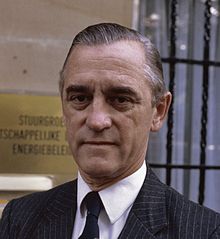Mauk de Brauw
Maurits "Mauk" Louis Jonkheer de Brauw (born September 14, 1925 in The Hague ; † November 12, 1984 in Leiden , Province of South Holland ) was a Dutch economic manager and politician of the People's Party for Vrijheid en Democratie (VVD), the Democratic Socialists '70 (DS'70) and later the Democrats 66 (D66), who was a member of the Second Chamber and between 1971 and 1972 a minister without portfolio responsible for science policy and higher education in the cabinet of Prime Minister Barend Biesheuvel . As a minister, he tried in vain to increase the tuition and enrollment fees at universities, but failed due to resistance in the First Chamber of the States General . On the other hand, his plan met with resistance in the Council of Ministers, namely from Social Affairs Minister Jacob Boersma . After a disagreement with Willem Drees jr. came about the political orientation of the DS'70, he left the party and later became a member of the D66. In the 1980s he was chairman of the steering group for the broad public discussion on nuclear energy (Brede Maatschappelijke Discussie over Kernenergie 1981-1983) .
Life
Family, studies and professional career
De Brauw comes from a family of diplomats, officers and politicians. His great-grandfather Willem Maurits de Brauw was a long-time member of the First and later of the Second Chamber of the States General, while his grandfather Willem Maurits de Brauw was Colonial Minister between 1882 and 1883 and then Commissioner of the King of the Province of Zeeland from 1883 to 1897 . His father Louis Maurits de Brauw was a diplomat, so that he himself received most of his school education abroad, between 1931 and May 1940 at the German School in Sofia and then between May 10, 1940 and March 10, 1941 there American College . He then attended the Irish Brother School in Calcutta between 1941 and 1942 and, most recently, the Episcopal College in Cape Town , a private school for boys, from 1942 to 1943 .
After finishing school he volunteered for military service and took part in Operation Overlord , the landing in Normandy , as a member of the Prinses Irene Brigade in 1944 .
After the end of the war, de Brauw began studying law in the Netherlands at the University of Leiden in 1945 , which he completed on July 7, 1954. He then joined NV Unilever in 1954 and, after various commercial functions, became Secretary of the Board of Management in 1958, before becoming Vice Director between May 1, 1960 and June 1, 1963 and then from June 1, 1963 to July 6, 1971 was director of the NV Nationale Levensverzekeringsbank in Rotterdam . At the same time, he was also a member of the board of directors of the insurance company NV Nationale-Nederlanden from January 1, 1963 to July 1971 , where he was responsible for marketing and later social affairs and administrative automation.
Minister and MP
De Brauw, who was originally a member of the Volkspartij voor Vrijheid en Democratie (VVD), joined the Democratisch Socialisten '70 (DS'70) in January 1971 and shortly afterwards became chairman of their commission for science, education and research.
On July 6, 1971, Prime Minister Barend Biesheuvel appointed him minister without portfolio, responsible for science policy and higher education in his cabinet. As a minister, he tried in vain to increase the tuition and enrollment fees at universities, but failed due to resistance in the First Chamber of the States General. On the other hand, his plan met with resistance in the Council of Ministers, namely from Social Affairs Minister Jacob Boersma. This ultimately led to his resignation as minister on July 20, 1972 and Minister of Education Chris van Veen also taking over responsibility for the science department. For his services he was awarded the Knight's Cross of the Order of the Dutch Lion on August 29, 1972 .
A few months after leaving the government, de Brauw was elected a member of the Second Chamber on December 7, 1972, to which he was a member until April 1, 1975. He also became chairman of the DS'70 in 1973, but resigned from this position in 1975 after differences of opinion with Willem Drees jr. about the party's political orientation. These different political views ultimately also led to his voluntary renunciation of his parliamentary mandate.
After leaving parliament, he became chairman of the Utrecht-based consultancy Berenschot on August 5, 1975, and worked there until August 1, 1980. In 1980 he joined the Democrats 66 (D66) as a member. Later he was involved between January 1981 and January 1984 as chairman of the steering group for the broad public discussion on nuclear energy (Brede Maatschappelijke Discussie over Kernenergie 1981-1983) , before he was most recently coordinator for the from September 1 until his death on November 12, 1984 Higher education in the province of Friesland was.
Web links
- CV in Parlement & Politiek
| personal data | |
|---|---|
| SURNAME | Brauw, Mauk de |
| ALTERNATIVE NAMES | Brauw, Maurits Louis Jonkheer de |
| BRIEF DESCRIPTION | Dutch economic manager and politician (PvdA) |
| DATE OF BIRTH | September 14, 1925 |
| PLACE OF BIRTH | The hague |
| DATE OF DEATH | November 12, 1984 |
| Place of death | Leiden , South Holland Province |
